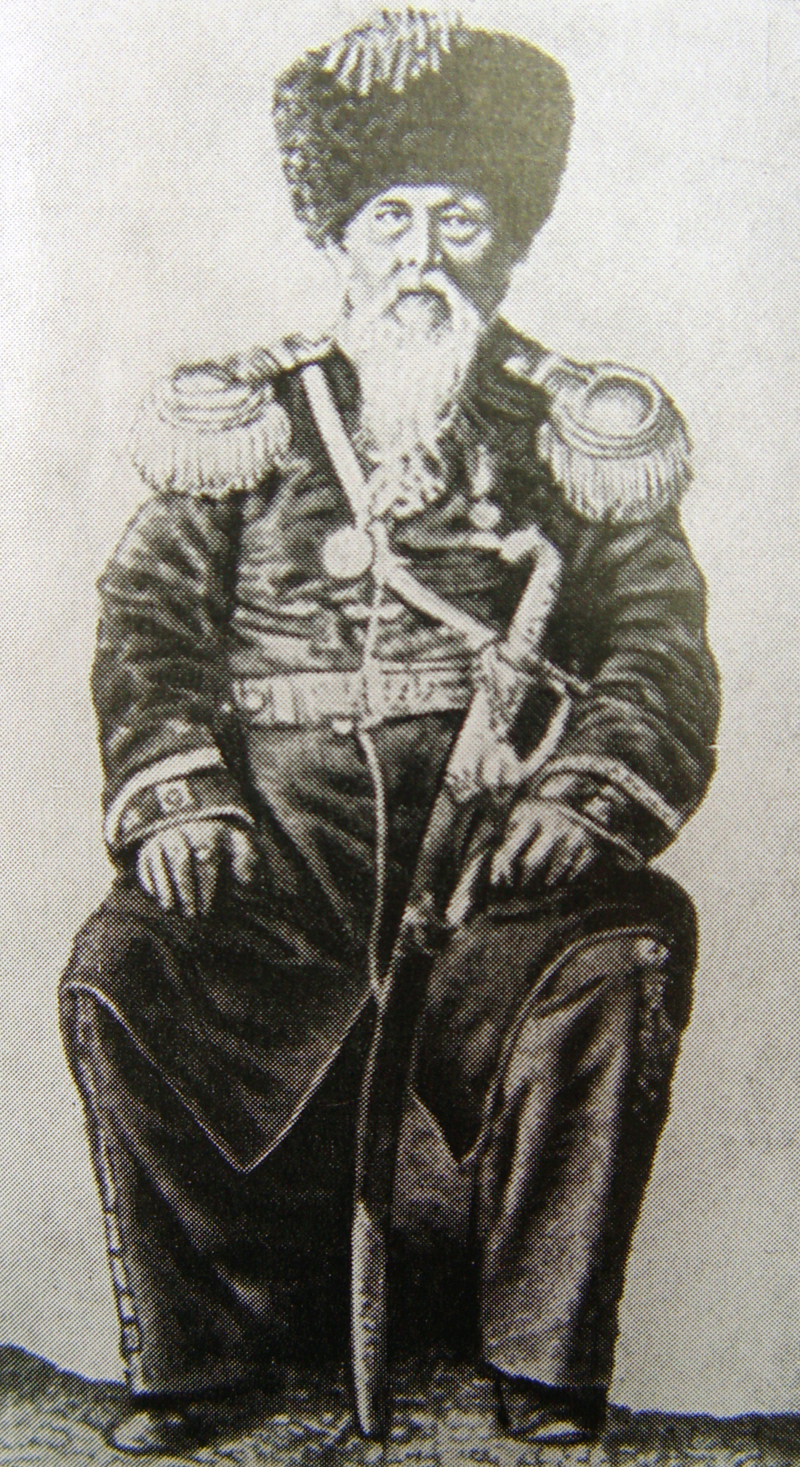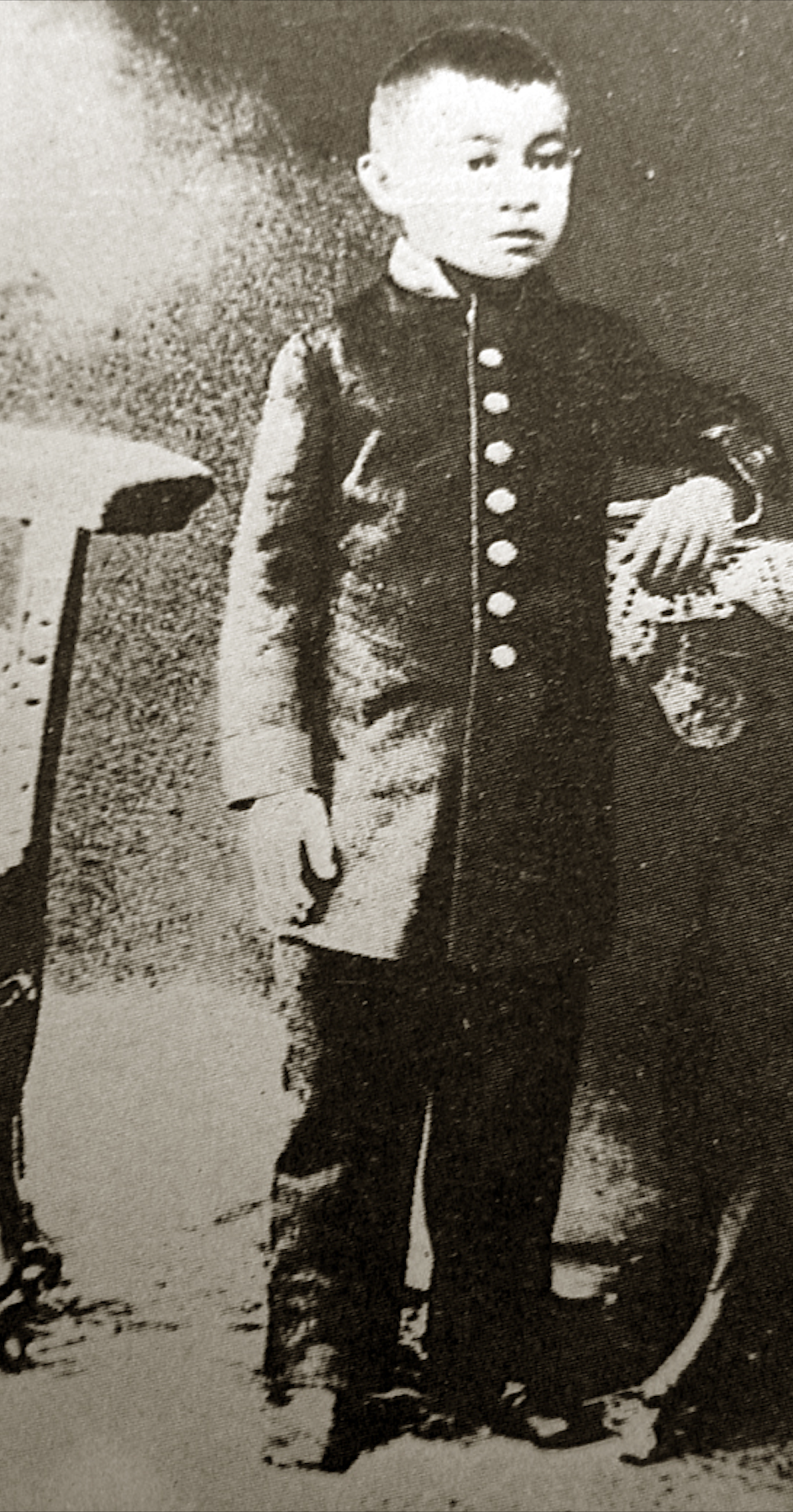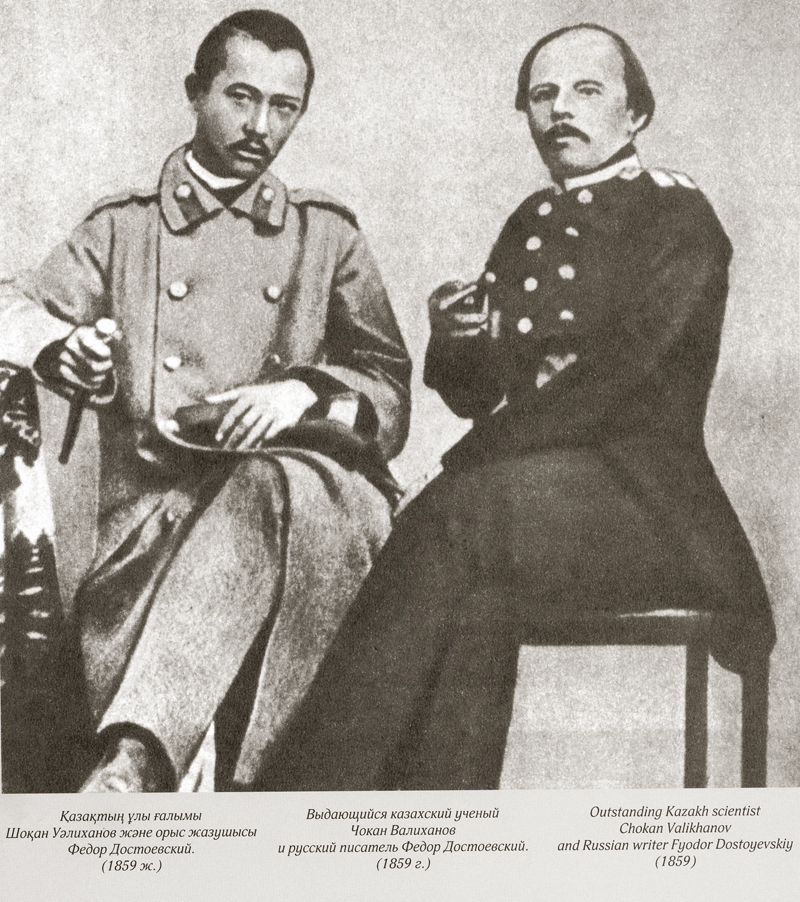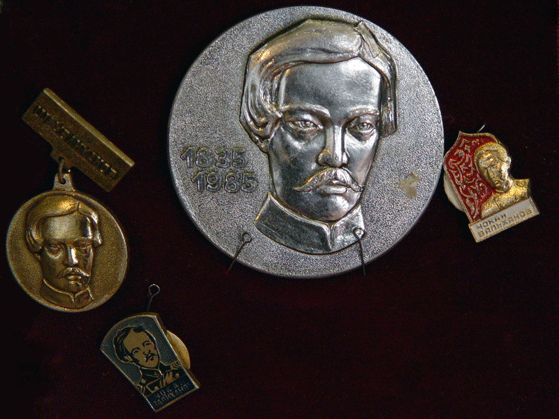












Family
The lineage of Chokan Valikhanov can be traced back to his great-grandfather Ablai Khan (1711-1781), who served as Sultan of the middle horde and was appointed Khan by Empress Catherine II of Russia in 1771. While Sultan, Ablai had developed a reputation as an unparalleled warrior because of his tactical exploitation of his enemies. He became extremely popular among the native population. Kazakh storytellers spread the legend of his prowess as a leader and combatant throughout the steppes. Like his great-grandson Chokan, Ablai Khan continues to be celebrated in Kazakh history.
Ablai Khan’s son and successor, Vali Khan, came to power during a changing political environment shortly after the death of his father. The Russian Empire abandoned the Khanship appointments and began a more concentrated campaign to take political command of the Kazakh territories. The new Kazakh political divisions debated whether to accept or oppose Russian influence. The descendants of Ablai Khan directly related to Chokan Valikhanov continued the tradition of honoring their Russian appointments, but other parts of Ablai’s vast family tree chose not to remain loyal to the Russian Empire. For example, Ablai’s grandson, Kenesary Kasimov, joined a resistance faction during Valikhanov’s childhood and found himself on an opposing side to Vali’s son Chingis, Kasimov’s cousin and Valikhanov’s father, who was serving with the Siberian Line Cossack. Vali later married an erudite woman named Aiganym, who was strongly pro-Russian and who aligned herself politically with Russian officials and merchants. She was so highly regarded that Emperor Alexander I of Russia used government funds to provide her with a European-style estate that featured living quarters, a sauna, and a mosque built with a crescent moon atop a traditional western European steeple.
Chingis Valikhan, one of seven males born to Vali Khan, succeeded his predecessor in accepting appointment with the Russian Empire. In addition, he was the first in the family line to secure a rank within the Russian military. His mother Aiganym saw to it that he received a Russian military education in Omsk, where he became an officer in the Siberian Line Cossack Army. Around the time of Valikhanov’s birth in 1835 Chingis also achieved the level of senior Sultan (a position he would hold six times) and was acclaimed by Russian officials as a positive example for the native people of Kazakhstan.
Chingis fathered six sons. The most famous was Mukhammad-Khanafiia, known commonly as Chokan Valikhanov.

Birthplace and Childhood
Chokan was born November 1835 in the newly developed Aman-Karagaiskii district within the Kushmurun fort in modern-day Kustanai oblast’, Republic of Kazakhstan. Chokan was a fourth generation descendant of the great Ablai Khan.
Chokan spent his youth in Kushmurun in his father’s traditional yurt, where he learned of Kazakh folklore, food, hunting practices, and musical customs. Similar to Kazakhs of his time, he drank kumis (fermented mare’s milk) and grew to appreciate the significance of Kazakh storytelling traditions. Chingis arranged his son’s early education, enrolling him in 1842 at age six in a small private school providing a secular education. It was here that he began his studies of Arabic script and foreign languages, including Chagatai, which served as the Kazakh lingua franca of the time. The young Chokan was notably gifted in art and linguistics, with an interest in oral literature and the depiction of landscapes. His childhood fascination with oral histories and map making would follow him throughout his career.
At an early age Chokan moved from his father’s home to the estate of his paternal grandmother, the powerful Aiganym, in Syrymbet, located within the present day Kokchetav oblast’. She was greatly influential in Chokan’s childhood while he lived with her and likely passed on her strong support of Russia. Chokan spent much of his childhood prior to his enrollment in the Siberian Cadet Corps with his pro-Russian grandmother.

The Czarist Cadet
Aiganym advocated strongly that Chokan get a Russian military education. In 1847, the young Valikhanov, then age 11, left Kazakhstan for Omsk, Siberia to enroll in the Kadet Korpus. His departure for Omsk marked both the beginning of a new life for Valikhanov and the beginning of his Russian military education and involvement.
Omsk of 1847 was the capital of Western Siberia and headquarters to the Siberian Cossack Army, in which Chingis had risen to the rank of senior Sultan and eventually Colonel. The Omsk Cadet Corps had been founded in 1845, based on the lesser school his father attended. The Cadet Corps was regarded as the preeminent educational facility in Siberia and afforded Chokan the finest education available. Upon his arrival, Chokan was the only Kazakh in the academy and drew attention from the faculty for his exceptional intelligence.
Much of the information on Chokan’s Cadet years (1847-1853) came from his colleague G.N. Potanin, who became a prominent explorer. Throughout his life, Potanin largely championed the achievements and efforts of his friend Chokan. During the Cadet years in Omsk, Chokan benefited from the local intelligentsia, who included the Gutkovskii and Kapustin families and the chemist Mendeleev. Potanin suggested that Chokan’s relationships with these families and individuals influenced his sentiment towards Russian life and that during his time in Omsk he came to admire both Russian and European culture.
Chokan graduated from the Omsk Cadet Corps in 1853, one year early due to the restriction of military science being taught to Cadets from Asiatic Russia. He received the rank of Kornet and was assigned to the Sixth Cavalry Regiment of the Siberian Cossack Army. Valikhanov served his initial appointment in Omsk during the 1850s, enjoying the social culture while developing a taste for cigars and champagne. It was in his post-graduation years in Omsk that Chokan sketched his famous self–portrait, depicting himself as young man in military attire lounging while enjoying a cigar.

"The Meteor Flash"
In 1860, Chokan Valikhanov’s family, then headed by Chingis Valkihan, had achieved a status unprecedented by Kazakhs. His father’s military career by then included six appointments as senior Sultan of Kushmurun okrug, a term as chief Kazakh advisor to the frontier board, promotion to Colonel, and a separate term as senior Sultan in the Kokchetav okrug. In regards to Chingis’ accomplishments by the early 1860s, Valikhanov scholar Kermit E. McKenzie wrote, “One could justly expect that an even greater future lay before Valikhanov.”
Based on his achievements in various disciplines of expedition, publication, science, and political favor, by the youthful age of twenty-five Chokan Valikhanov had become a Kazakh national hero. However, in the spring of 1861 he became seriously ill with tuberculosis and had to leave St. Petersburg after his appointment to the Department of the Ministry of Foreign Affairs in 1860. He returned to his native land in hopes of restoring his health. He never returned to St. Petersburg. After he returned to the steppe, frequent relapses in his health stymied many attempts to further advance his brilliant career. Chokan wrote to his friend Fyodor Dostoyevsky in early 1862 indicating that he intended to return to St. Petersburg in both October and December of 1861, but was unable to do so. On another occasion Valikhanov mentioned the possibility of pursuing a Russian consul appointment in Kashgar, or possibly campaigning for senior Sultan like his father. The letters to Dostoyevsky noted that however frustrated he was about being hindered by poor health, Chokan remained passionately interested in the advancement of his career. In 1862, he ran for senior Sultan and won the popular vote, but he was never confirmed by Governor-General Diugamel on the pretense that Chokan’s health was not adequate for the position.
Chokan embarked on a government-funded mission to collect materials on Kazakh judicial practices in 1863. This job, assigned to him by Diugamel, led to the “Memorandum on the Judicial Reform.” In 1864, Chokan assisted with the move of Colonel M.G. Cherniaev’s forces west from the fortress of Vornoe, located in the east of the Kazakh steppe. Chernaiev advanced towards the Kokandian resistance, planning to attack the fort at Aulie-Ata. Chokan pleaded for negotiations between the opposing forces, but to no avail. There ensued a violent siege of Aulie-Ata and a victory for Cherniaev’s forces. Chokan left Chernaiev after the events at Aulie-Ata and headed back to the fortress at Vornoe. From there he moved into the village (aul) of Sultan Tezek, located in Semirechie, north of the Vornoe and Ili River. Although Chokan left Chernaiev’s forces, the Colonel later wrote a letter of recommendation for Chokan’s promotion to the rank of rotmistr.
Chokan spent his last remaining months in the village of Sultan Tezek, eventually marrying Tezek’s sister, Aisary, who remains somewhat of an unknown figure in history. During this time, letters of correspondence to General Kolpakovskii, military governor of Smipalatinsk oblast, dated between November 1864 through February 1865, addressed Muslim revolts and rebel activity in nearby Kuldja. Kolpakovskii held such esteem for Chokan that he offered Chokan a position in his administration once his health was restored
This unfortunately never came to be. Chokan Valikhanov died on April 10, 1865 at the age of 29. He was buried in Kochen-Togan near the village of the Sultan Tezek. The tragic shortness of Valikhanov’s life leaves many unanswered questions regarding his capacity for further greatness. There appears to be little doubt that he never realized his full potential, and his latest contacts with Dostoyevsky asserted his continued desire to explore and work towards a mutual understanding between native peoples and the vastly expansive imperialism of the nineteenth century. N.I. Veselovskii, who in 1904 edited an early (and incomplete) edition of Valikhanov’s works, compared Valikhanov’s short, brilliant life to a “meteor flashing across the field of oriental studies,” a metaphor later repeated by many other authors. One hundred and seventy-five years after his death, his visage appears on Kazakh currency and academic institutions, and there are many statues of him. He is a national hero of Kazakhstan and continues to inspire academics worldwide.